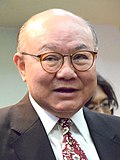2017 Hong Kong Chief Executive election
|
|
|||||||||||||||||||||||||
|
|||||||||||||||||||||||||
|
All 1,194 votes of the Election Committee 601 votes needed to win |
|||||||||||||||||||||||||
|---|---|---|---|---|---|---|---|---|---|---|---|---|---|---|---|---|---|---|---|---|---|---|---|---|---|
| Opinion polls | |||||||||||||||||||||||||
| Turnout | 99.33% |
||||||||||||||||||||||||
|
|||||||||||||||||||||||||
|
|||||||||||||||||||||||||
The 2017 Hong Kong Chief Executive election was held on 26 March 2017 for the 5th term of the Chief Executive of Hong Kong (CE), the highest office of the Hong Kong Special Administrative Region (HKSAR). Former Chief Secretary for Administration Carrie Lam beat former Financial Secretary John Tsang and retired judge Woo Kwok-hing, receiving 777 votes from the 1,194-member Election Committee.
The two front-runners, Lam and Tsang, emerged after incumbent Chief Executive Leung Chun-ying surprisingly announced he would not run for a second term. Both resigned from their posts in the government. Despite leading in the polls, Tsang struggled to receive nominations from the pro-Beijing electors and had to rely heavily on democrats. Lam, with the PRC's Liaison Office actively lobbying for her, attracted 580 nominations, almost half in the Election Committee and only 21 votes short of winning the final election, while Tsang and Woo received 165 and 180 nominations respectively, most of which came from the pro-democracy camp which consisted of about 320 members.
As a result, Lam received 777 electoral votes, beating Tsang's 365 and Woo's 21 votes, higher than Leung's 689 votes in the last election, becoming the first female Chief Executive.
The highest government office of Hong Kong, the Chief Executive, is selected by a 1,200-member Election Committee (EC) which is divided into various subsectors and dominated by pro-Beijing politicians and tycoons. Since the terms of Article 45 of the Basic Law of Hong Kong requiring "selection of the Chief Executive by universal suffrage upon nomination by a broadly representative nominating committee in accordance with democratic procedures" have not been implemented, the progress to universal suffrage has been the dominant issue in Hong Kong politics since the transfer of sovereignty in 1997.
...
Wikipedia



